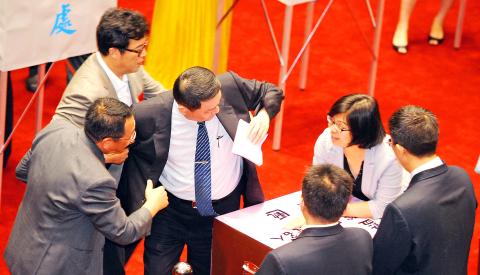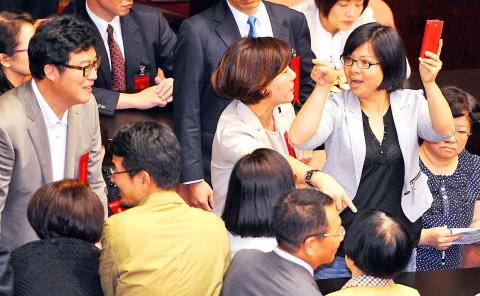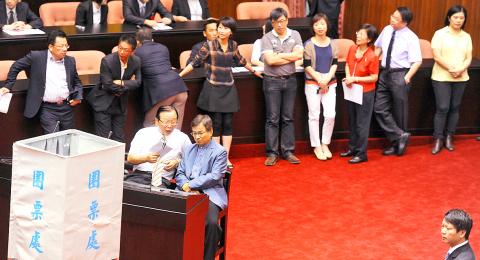An opposition blockade yesterday kept the legislature from voting on the nominations for Control Yuan members on the final day of the extraordinary legislative session after the Chinese Nationalist Party (KMT) reportedly decided to monitor its legislators’ votes to ensure they toed the party line, bringing an early end to the day’s meeting.
The Legislative Yuan had been scheduled to vote in the morning on the two nominees for president and vice president of the government watchdog and vote in the afternoon on the other nominees.
After Legislative Speaker Wang Jin-pyng (王金平) announced the start of voting, Democratic Progressive Party (DPP) lawmakers asked their KMT colleagues not to show their marked ballots to the party’s ballot overseer or other KMT lawmakers and also asked for cross-party negotiation.

Photo: Liu Hsin-de, Taipei Times
When the KMT did not respond to their requests, the DPP legislators created a roadblock by lining up to receive the ballot papers, but refusing to actually accept them and cast a vote.
From 9am to 11am — when the morning vote was scheduled to end — KMT, DPP and Taiwan Solidarity Union (TSU) legislators exchanged heated barbs in a confrontation that came close to a physical altercation.
DPP Legislator Yu Mei-nu (尤美女) said the KMT had intended to divide its lawmakers into groups of four and each group was to vote simultaneously at the four ballot boxes so they could “monitor each other’s votes.”

Photo: Liu Hsin-de, Taipei Times
While the DPP and the TSU had been the ones to initiate the blockade, not all KMT legislators were happy with their caucus’ call to push through the nominations.
“I personally think that as the roster of Control Yuan nominees this time has been widely criticized, the party should leave it to lawmakers themselves to exercise their own judgement… If the party insists on a ‘yes’ vote, the party’s prospects in the year-end elections will be greatly impacted,” KMT Legislator Chen Ken-te (陳根德) said.
KMT Legislator Lu Hsueh-chang (呂學樟) called the restriction “an insult to the lawmakers’ integrity” and the showing of marked ballots “a violation of the law.”

Photo: Liu Hsin-de, Taipei Times
The KMT and DPP held press conferences after the morning’s imbroglio. At its press conference, the KMT caucus fumed over what it said was yet another obstruction of legislative procedure by the DPP, claiming that the DPP’s interference violated Article 142 of the Criminal Code, which stipulates that “a person who … interferes with another in the free exercise of his right to vote … shall be sentenced to imprisonment for not more than five years.”
The caucus said the KMT would take legal action against DPP lawmakers.
KMT caucus deputy secretary Alex Fai (費鴻泰) said his party would call for a second extra session to vote on the Control Yuan nominations. He said the second session would be scheduled to start on July 28.
“If the second extra session does not work, there will definitely be a third or a fourth one,” Fei said.
However, the DPP said the KMT has been trying to use party discipline to “ram through the worst nominations” in Control Yuan history and refused to promise to allow a clean, supervision-free vote
DPP lawmakers cited the Criminal Code as well at their press conference.
The KMT was guilty of “procuring an incorrect result from voting or altering election returns by fraud or other illegal means,” a violation of Article 146 of the Criminal Code, and of Article 148, which prohibits a person prying into the content of a secret ballot, Yu said.
DPP Legislator Hsiao Bi-khim (蕭美琴), the caucus secretary-general, said that during cross-party negotiations last week the KMT had agreed not to oversee its lawmakers’ votes or have them show their marked ballots.
The DPP’s “technical hindrance” was simply a response to the KMT’s breach of that tacit agreement, she said.
DPP caucus director-general Tsai Chi-chang (蔡其昌) questioned the KMT’s right to accuse the opposition of violating the law and the Constitution over the nominations, reminding the KMT that it had former president Chen Shui-bian’s (陳水扁) Control Yuan nominations for as long as three years.
“We are undaunted by the KMT’s threat of a lawsuit,” Tsai said.
The KMT and its chairman, President Ma Ying-jeou (馬英九), should leave the legislature to deliberate the nominations rationally, Tsai said.

SEPARATE: The MAC rebutted Beijing’s claim that Taiwan is China’s province, asserting that UN Resolution 2758 neither mentions Taiwan nor grants the PRC authority over it The “status quo” of democratic Taiwan and autocratic China not belonging to each other has long been recognized by the international community, the Mainland Affairs Council (MAC) said yesterday in its rebuttal of Beijing’s claim that Taiwan can only be represented in the UN as “Taiwan, Province of China.” Chinese Minister of Foreign Affairs Wang Yi (王毅) yesterday at a news conference of the third session at the 14th National People’s Congress said that Taiwan can only be referred to as “Taiwan, Province of China” at the UN. Taiwan is an inseparable part of Chinese territory, which is not only history but

CROSSED A LINE: While entertainers working in China have made pro-China statements before, this time it seriously affected the nation’s security and interests, a source said The Mainland Affairs Council (MAC) late on Saturday night condemned the comments of Taiwanese entertainers who reposted Chinese statements denigrating Taiwan’s sovereignty. The nation’s cross-strait affairs authority issued the statement after several Taiwanese entertainers, including Patty Hou (侯佩岑), Ouyang Nana (歐陽娜娜) and Michelle Chen (陳妍希), on Friday and Saturday shared on their respective Sina Weibo (微博) accounts a post by state broadcaster China Central Television. The post showed an image of a map of Taiwan along with the five stars of the Chinese flag, and the message: “Taiwan is never a country. It never was and never will be.” The post followed remarks

NATIONAL SECURITY: The Chinese influencer shared multiple videos on social media in which she claimed Taiwan is a part of China and supported its annexation Freedom of speech does not allow comments by Chinese residents in Taiwan that compromise national security or social stability, the nation’s top officials said yesterday, after the National Immigration Agency (NIA) revoked the residency permit of a Chinese influencer who published videos advocating China annexing Taiwan by force. Taiwan welcomes all foreigners to settle here and make families so long as they “love the land and people of Taiwan,” Premier Cho Jung-tai (卓榮泰) told lawmakers during a plenary session at the Legislative Yuan in Taipei. The public power of the government must be asserted when necessary and the Ministry of

Proposed amendments would forbid the use of all personal electronic devices during school hours in high schools and below, starting from the next school year in August, the Ministry of Education said on Monday. The Regulations on the Use of Mobile Devices at Educational Facilities up to High Schools (高級中等以下學校校園行動載具使用原則) state that mobile devices — defined as mobile phones, laptops, tablets, smartwatches or other wearables — should be turned off at school. The changes would stipulate that use of such devices during class is forbidden, and the devices should be handed to a teacher or the school for safekeeping. The amendments also say